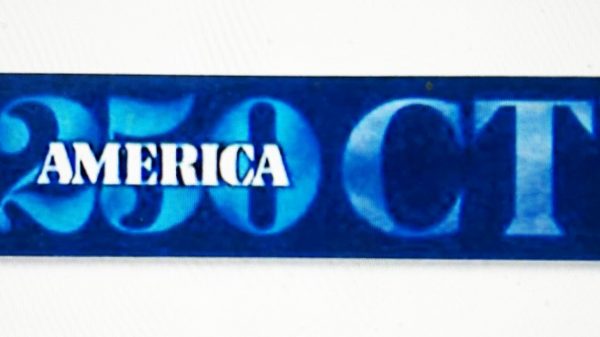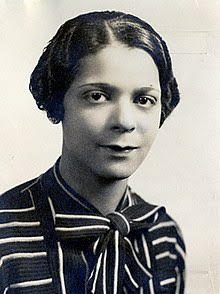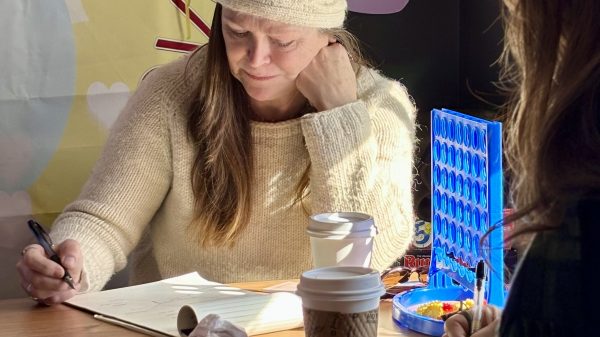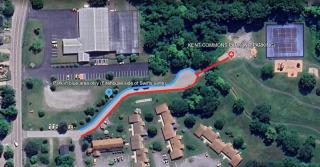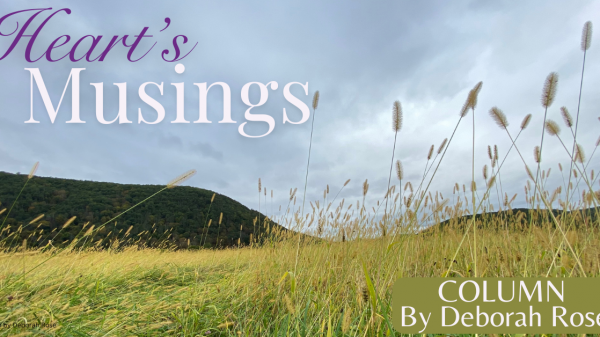KENT – Warning that his talk would probably not be the “feel-good discussion of the spring,” John A. Lauder shared his insight into the current state of global nuclear weapons with a crowd of 45 people March 9. However, he did punctuate his talk with humor throughout.

Kent Memorial Library hosted the talk but had to move it to Town Hall due to intense interest in the topic. He was introduced by Sarah Chase, who shared his extensive background with over 33 years of government service working for the CIA, the National Reconnaissance Office and as an arms control negotiator.
“He’s been one of the many people charged with keeping us safe,” Chase said. “John has helped lead influential studies to improve intelligence on weapons of mass destruction and to facilitate verification of international agreements.”
She noted with a smile that they both graduated from Hiram College in Ohio summa cum laude.
Chase had organized his visit and timed it to be the day before the Oscars, when the movie Oppenheimer was nominated for 13 awards. The movie won seven of the categories, including Best Picture, Best Director for Christopher Nolan, Best Actor for Cillian Murphy, Best Supporting Actor for Robert Downey, Jr., Best Cinematography and Best Original Score.
Lauder acknowledged that he still does some advising with Los Alamos National Laboratory in arms control issues and the officials prepped him with a number of items related to Oppenheimer for the talk, including his farewell speech, which he quoted, “I bid you as a fellow warrior about the fix we’re in.”
“If Oppenheimer were to come back into this room, he would be astonished that we have gotten through almost 80 years after the first testing of a nuclear weapon and we haven’t blown up the world,” Lauder said.
Acknowledging that it is still “a very scary world,” Lauder recommended reading a recently published opinion series by the New York Times “At the Brink” on the current threat of nuclear weapons.

He called it “more perilous now” than at any time during his long career in part because of the dysfunction in Washington, D.C. as well as the new technology threats. Chase posed a question about the impacts of artificial intelligence and Lauder said the misinformation and disinformation could be perilous.
“When we’ve had nuclear crises in the past, it has been individuals at various times who said it didn’t look right,” he said. Those human decision makers chose not to take action. “Humans tend to in those circumstances make pretty good decisions.”
Several people in the audience posed questions to him. Athenaide Dallett asked about degrading silos and floppy disks that were a concern years ago and asked it has changed. Lauder said the warheads are much more reliable but he pointed out that floppy disks can’t be hacked through the internet.
Andrea Schoeny said she grew up in Albuquerque, New Mexico, and has been to Los Alamos many times and she’s very familiar with the area.
“When you talk about the restarting plutonium pits and the domestic impact of nuclear war, I am fully aware that my home state doesn’t exist without the DoD (Department of Defense) and nuclear,” Schoeny said. “The federal government still has not taken responsibility for all the people at the Trinity site where they tested the bomb and they have the highest incidence of cancer in the world.”
She asked what people could do. Lauder acknowledged that in 1945 those developing the bomb didn’t truly understand the impacts and were “surprised by the footprint of nuclear waste.”
“The good news is that we’ve gotten better on remediation,” Lauder said.
He also talked about the importance of keeping dialogue channels open with Russia and said that he worries most about Russia.
“One of the reasons we’ve gotten through 78 years of the nuclear era is that ultimately leaders say ‘I’ve got more to lose than I’ve got to win,’ ” Lauder said, adding that holds them from taking action that will result in nuclear war.


